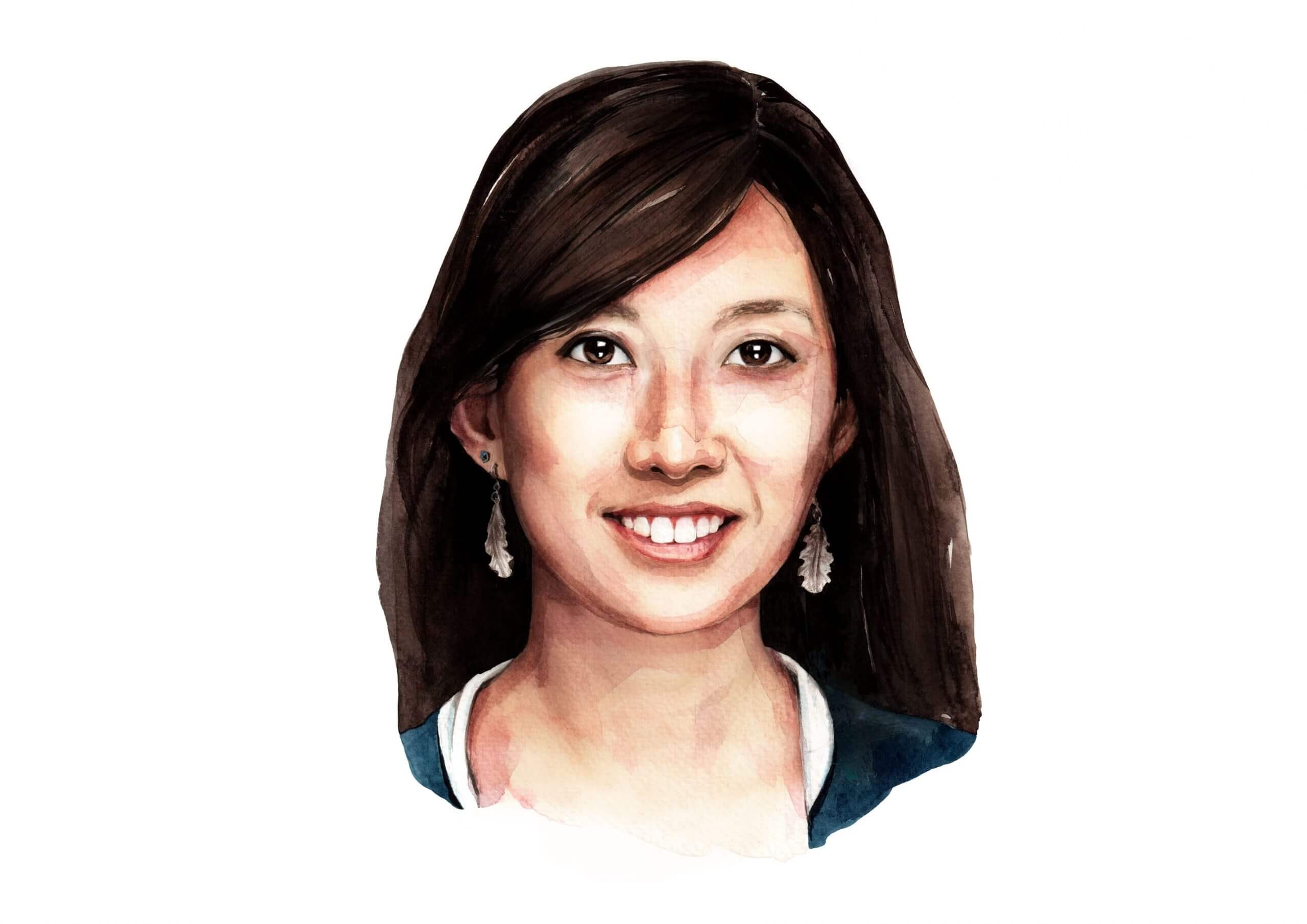
Born in Indonesia on the island of Java, Felicia Widjaja is the elder child amongst two younger sisters and one younger brother. Her grandparents, both maternal and paternal, immigrated to Indonesia and settled in Jakarta from China. Felicia’s parents owned a convenience shop in Jakarta and were so dedicated to it that they never took a day off. Felicia stated that her family did not take a vacation and that she worked at the store even during her school holidays. The only outings she remembered were visits to grandparents and, on rare occasions, excursions out of town, such as a drive to the mountains after the store closed.
Early Life
Being the daughter of strict parents, Felicia spent a lot of time inside and was very protected from the chaos of big city life. Her life in Indonesia was studying, hanging out with her siblings, and working at her parents’ store on the weekends. If the family did take a trip somewhere, they would always make sure to come back at night to manage the store’s finances from the day.
However, in Indonesia, there was a lot of school time. Felicia attended school from Monday to Saturday. She started her day at 6.45 am and it sometimes ran up to 3 pm or maybe 5 when she had science labs. Even when she got home, she had piano lessons, Mandarin lessons (these were done in private as Mandarin was discouraged in the population in Java), and swimming lessons from house tutors. It was unclear to Felicia how her family was unclear about how to appreciate Chinese culture in Indonesia because they were not permitted to speak Chinese outside the home; thus, Mandarin classes had to be secret within the home. This was due to Indonesia’s desire to promote just its native language.
When her parents and grandparents came to Indonesia in the early 60s or 50s, there were still Chinese schools, Chinese radio, and other things. After 1965, during riots, Chinese schools, radio-TV, and Chinese characters in China Town were simply banned.
Although Felicia and her family spoke Indonesian, in 6th grade, she started learning English. When speaking about what she wanted to do in her career, she said,
“I am not sure what I want to do, but maybe the part of being a business owner is somewhere in my mind. I had no exposure to any role as no one in the family was a lawyer, doctor, or scientist. My grandparents were also business owners, and one of my uncles and aunts were engineers.”
Felicia never actually thought about career aspirations growing up, even in high school, but she was expected to do well academically. Her parents told her that she could get a scholarship and then go to a college or university in Australia or Singapore.
The Riots that Changed Her Life
However, when riots broke out in Jakarta in 1998, there was a financial crisis and high inflation, and many people lost their jobs. The violent riots were triggered by corruption, economic problems, including food shortages and unemployment. It eventually led to the fall of the Indonesian government that held power for over three decades. While people in Indonesia were mostly attacking the ethnic Chinese, most of the casualties in all of the riots were caused by a massive fire that occurred among looters. At that time, Indonesians wanted somebody to blame, and because the Chinese population was small, but had economic power, they turned their anger towards them.
During the riots, her parents’ shop was attacked because they were known to be ethnically Chinese. She recalled being trapped and hiding in the house of her childhood. Felicia was only 17 years old at the time. Locals plundered the store for almost 6 hours while her family hid to save their lives. Fortunately, they were able to flee with the assistance of four cops standing guard with their rifles. At that time, while hiding and silent in fear, Felicia made a pledge to herself that she would not live in a place where she was subjected to such treatment and had to figure out a method to avoid being in the same scenario again.
Because the country was under siege and most of the airlines were not ready to fly out of Indonesia. Singapore Airlines was the only one flying that day. They arrived in Singapore on tourist visas, which took 1.5 hours. Felicia described the scene as a battleground. Buildings and vehicles were on fire, and soldiers were walking around. The airport was the sole location where international citizens were safe.
Her Journey to The U.S.
Felicia’s parents felt helpless in Singapore after living there for a while with her aunt and uncle. They did not have a clear path forward for themselves as everything they had ever done was put into that store in Jakarta. As a result, they returned to check if the store might be rebuilt. But, sadly, things had changed too much. Everything their family had before was completely gone. The family decided to stay in Singapore. Felicia, who had almost finished high school in Indonesia, had the option of starting school in Singapore or to move with her uncle and aunt to the United States to finish high school. Because of the different schooling systems in Singapore, Felicia was not allowed to be in 10th grade and was instead placed in the 8th grade, which she did not desire. As a result, she decided to relocate to the United States where she would be put into 11th grade based on her age.
Coming from Jakarta, life in 1998 US was very different for her. She had not known about computers, the internet, or email. While her mom was able to come with her and help her adjust for the first two months, she had to then leave to be with her family in Singapore. At that time, Felicia’s aunt and uncle decided to only speak English to help her learn. Her uncle took her to school and guided her to learn English by watching news reports with different accents and practicing them.
That year of high school, she was able to apply for a political refugee status, which she learned about through the counselors at her school. During the interview, even though she did not have the language skills to express what happened, she relived the events of that day in Jakarta using pictures. She immersed herself into learning English and acclimated herself to life in the US. She was able to finish her junior and senior year credits within one year.
Her Career Journey
Her first year of college, she went to the local Cal State school – Cal State East Bay Hayward, and then moved to U.C. Davis. Her uncle told her she had to figure out what she would study – so she went to the library to read about different careers. Felicia read books to find a career path that would be best for her. She picked biology as her college major as she liked science. Her mother, from afar, did try to encourage her to look into Computer sciences, as this was during the Dot Com boom. her mom thought that as computers and the internet are booming, she should get into something related to it, like computer science and programming. So, she tried it, but it did not work for her, but thought it was so boring and could not see herself doing that work for the rest of her life.
She moved to UCDavis as a Biology Psychology major, and at that time, her parents thought that she should be a doctor and do pre-med. After she graduated from UC Davis, she worked for one year in the A. Her college career counselor encouraged her to look into St. George’s University in Grenada and was accepted into their MD/MPH program where she ended up attending. However, after finishing the Masters in Public Health at St. George, she decided that she did not want to pursue her medical degree anymore.
She came back from Granada, got married to her long-distance boyfriend of five years, and started living in the Santa Cruise mountain. She met a pre-med counselor at Davis, who suggested that she apply to St. Gorgeous. Since she had just graduated from MPH and didn’t have much experience, she felt that her skill set was perfect for academic research. So as there were not many options in the Santa Cruise area, she applied to the one in Bay Area and then got the position as a clinical research supervisor at the transplant surgery UCSF.
After her first job in Davis, she had a good learning experience in Autism Research. Here she was into regulatory and admin work. However, she used to miss interacting with patients. Felicia also mentioned her love of working for kids. She had seen complex real-life living kidney transplants, liver transplants, etc. She worked at UCSF for one year in the same position and then started looking for the following position where kid’s patients are involved.
At UCSF, she found out that her old boss at U.C. Davis MIND Institute was working there as the P.I. for all Autism trials and research. She applied for the position in his lab and reached out to him. She did not have to be doing the same role as the UCDavis in this job. But here, she was appointed as the research manager for the lab, handling study coordinators, study startups for pharmaceutical companies, and drugs trials for Autism. She helped set up the company, study site activation with monitors, and budget. And she was doing the regulatory and admin staff from the beginning, running the study, and then ending it. She is in charge of all operations within the lab. Coordinating with the patients, research assistants, and all aspects of whatever the lab needs. She oversees the studies and works with the pharmaceutical companies in partnership with her lab.
Pandemic Effect on her Personal and Professional Life
She was unable to see patients in person throughout the outbreak. Fortunately, all of her clinical trials were completed prior to the pandemic. She has spent the last two years working on three autism studies, with two more on the way. Felicia, a mother of two pandemic children reveals that when she had her first daughter, she and her husband were working at that time, leaving the baby in the daycare when she was 9 months old. But during her second baby, everything was shut down, she had to take care of her baby, manage remote learning of her daughter, do household chores, cooking, and clean. Currently, she has a hybrid flexible schedule where she goes only to the office to see those patients every two weeks.
Words of Wisdom By Felicia Widjaja
Felicia Widjaja believes that one should think about long-term consequences while doing something. Although she never had a mentor, she believes that having a mentor who could guide you and help you be connected, especially in the same field, is important. She wanted to leave her current position to look for something that would help her balance parenting, work, and home life.
“It’s definitely and always a battle to balance your parenting, work, and home life. I feel like I have an occasional nanny, and one time had this thought about why I am paying someone to pay someone to hang out with my kids while I do the dishes and laundry. Then also, I feel like I am already at the top in terms of my position, so I want to move on to an industry like good pharma and do some good scientific research and do clinical trial operations for a program.”
